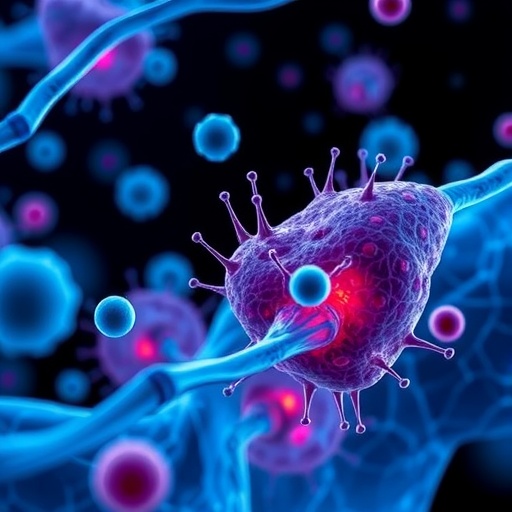In a groundbreaking study published in 2025, researchers have unveiled significant insights into the enigmatic world of tumor-resident bacteria and their potential roles in cancer therapy. This research marks a pivotal shift in our understanding of the relationships between bacteria and tumor biology, challenging traditional perspectives on cancer treatment. The study, led by Luo, Huang, and Wang, reveals how these bacteria might not only coexist with tumors but also influence their growth and the patient’s response to therapies.
For decades, the focus on cancer treatment has primarily concentrated on the tumor and its microenvironment, often overlooking the microbial constituents inhabiting these areas. Recent advances in microbiome research have prompted scientists to reconsider the impact of bacterial communities within tumors. These so-called “tumor-resident bacteria” carry unique genetic signatures that could alter tumor metabolism, immune surveillance, and even response to conventional treatment modalities such as chemotherapy and immunotherapy.
The research team meticulously analyzed samples from various tumor types, providing a comprehensive snapshot of the bacterial populations present. Their findings highlight diverse bacterial species that vary not only between different tumor types but also within individual tumors. This variability suggests a complex interaction landscape where bacteria can evolve and adapt in response to the tumor environment. Such dynamic interactions raise intriguing questions regarding how these bacteria contribute to tumor progression and patient prognosis.
One particularly striking revelation from the study is that specific bacterial strains are associated with better or worse outcomes in cancer patients. For instance, certain probiotic strains have been linked to enhanced immune responses against tumors, while others are correlated with tumor aggressiveness. This dual role emphasizes the necessity of further research to delineate the precise mechanisms by which these bacteria operate, particularly their potential to either hinder or help traditional therapies.
In the clinical context, understanding tumor-associated bacteria could lead to innovative therapeutic strategies. For example, integrating probiotics into treatment regimens could bolster the immune system’s capacity to combat cancer cells. Moreover, targeting harmful bacteria within the tumor could reduce the tumor’s ability to resist treatment. The prospect of manipulating these microbial communities opens new avenues for personalized medicine, where therapies are tailored not just to the cancer type but also to the bacterial profile of the individual patient.
As this field continues to evolve, researchers are also looking into the role of the human gut microbiome, which has shown potential in influencing the efficacy of cancer therapies. The gut bacteria’s ability to metabolize certain drugs could significantly impact their therapeutic outcomes. Hence, the interplay between gut flora and tumor-resident bacteria could form a crucial part of future cancer research, potentially leading to strategies that leverage both the gut and tumor microbiomes for enhanced treatment efficacy.
The implications of these findings extend beyond just improvement in treatment effectiveness. They also hint at the potential for new diagnostic tools based on bacterial signatures in tumors. This could enable clinicians to stratify patients according to their predicted response to therapies, ultimately leading to more effective and less toxic treatment protocols. The challenge lies in the intricacies of the microbiome, as further exploration is required to fully understand these bacterial-based relationships.
Moreover, the ethical considerations surrounding the manipulation of microbiomes are becoming increasingly important. Researchers must navigate the potential risks associated with introducing new bacterial strains into patients’ bodies, which can lead to unintended consequences. A deeper understanding of tumor-resident bacteria is not only vital for therapeutic advancements but also for ensuring patient safety in clinical applications.
Importantly, this research does not suggest that antibiotics should be avoided altogether, as some bacteria within tumors may contribute positively to therapy. Instead, it emphasizes the need for a careful and informed approach to antibiotic use in cancer patients. While antibiotics are often essential in preventing infections during immunosuppression, their indiscriminate use could disrupt the delicate balance of tumor-resident bacterial communities.
In conclusion, the study by Luo, Huang, and Wang represents a significant leap towards unraveling the complexities of the tumor microbiome. As researchers continue to delve deeper into the relationships among bacteria, tumors, and cancer therapies, we may soon witness a paradigm shift in the way we approach cancer treatment. By recognizing the integral role of these microorganisms, the quest for more effective and personalized therapies could transform the cancer landscape.
The future is bright for oncology as it intersects with microbiome research. As scientists uncover more about the intricate web of interactions between tumor-resident bacteria and cancer cells, we can expect innovations that will not only enhance therapeutic approaches but also expand our fundamental understanding of cancer biology. Ultimately, this exciting field promises to contribute significantly to the ongoing battle against cancer, offering hope to millions of patients worldwide.
Each revelation about tumor-resident bacteria further emphasizes the importance of interdisciplinary collaboration among oncologists, microbiologists, and geneticists. To truly harness the potential of these microscopic entities, a collective effort to share knowledge and resources will be essential. As this research progresses, the integration of these findings into clinical practice may revolutionize how cancer is understood and treated.
As we stand on the brink of a new era in cancer therapy, one thing is certain: the roadmap carved out by this research holds the promise of brighter horizons for cancer treatment, where understanding and manipulating tumor-resident bacteria could lead the way towards more successful outcomes and a better quality of life for patients afflicted by this relentless disease.
Subject of Research: Tumor-resident bacteria and their application in cancer therapy
Article Title: Advancements in understanding tumor-resident bacteria and their application in cancer therapy
Article References:
Luo, YC., Huang, XT., Wang, R. et al. Advancements in understanding tumor-resident bacteria and their application in cancer therapy.
Military Med Res 12, 38 (2025). https://doi.org/10.1186/s40779-025-00623-1
Image Credits: AI Generated
DOI: https://doi.org/10.1186/s40779-025-00623-1
Keywords: Tumor-resident bacteria, cancer therapy, microbiome, personalized medicine, immunotherapy, oncobiology, diagnostic tools.




